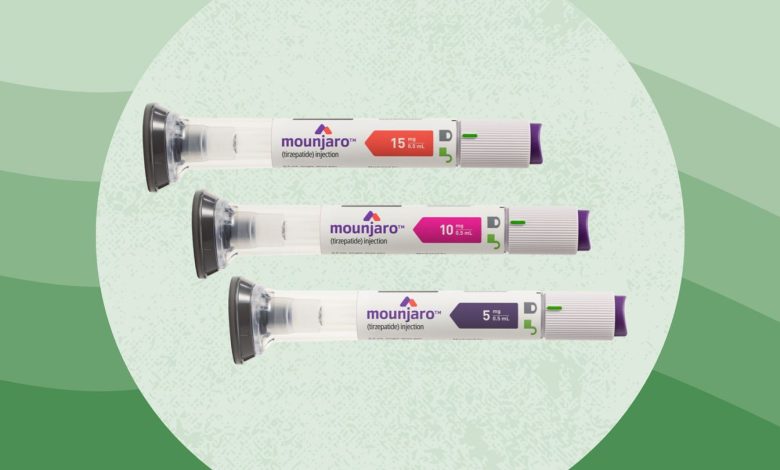A 101 Guide for This Type 2 Diabetes Drug

[ad_1]
Tirzepatide is shaping up to be a game changer for people who struggle with type 2 diabetes and obesity. That’s because it is racking up a solid track record of peer-reviewed research of being highly effective for treating both conditions.
Better Blood Sugar Management in Type 2 Diabetes So far, this class of drugs has shown significant effectiveness in the treatment of type 2 diabetes, based on results of five randomized clinical trials cited by the FDA in its May 2022 statement announcing the approval of tirzepatide injection as a treatment for the disease, when used in combination with diet and exercise. Hailing the approval as “an important advance in the treatment of type 2 diabetes,” the agency pointed out that on average, patients receiving the maximum recommended dose of Mounjaro (15 mg) saw their hemoglobin A1C levels lowered by 1.6 percentage points more than placebo when used as standalone therapy, and 1.5 percentage points more than placebo when used in combination with a long-acting insulin. A1C is a two- to three-month average of blood sugar levels, as the Centers for Disease Control and Prevention (CDC) notes.
Other randomized clinical trials that compared Mounjaro with other type 2 diabetes medications found that improved outcomes with Mounjaro. The maximum recommended dose of Mounjaro had lowered individuals’ A1C by 0.5 of a percentage point more than semaglutide (Rybelsus, Ozempic, Wegovy), per one study; 0.9 of a percentage point more than the long-acting insulin degludec (Tresiba), per another study; and 1.0 percentage point more than another long-acting insulin glargine (Lantus), according to another study.
Weight Loss Tirzepatide appears to be exceptionally effective for weight loss in people with and without type 2 diabetes, according to the results of two clinical trials that tested its effectiveness for that use.
Nearly every participant in a study published last year who received tirzepatide injections in conjunction with diet and exercise lost weight. The Surmount-1 randomized trial, which was published in the July 2022 issue of The New England Journal of Medicine, involved more than 2,500 people who do not have diabetes but do have obesity (defined as a body mass index of 30 and up) or with a weight-linked disease and a BMI of 27 and up.
Participants were randomly assigned to receive a 5 mg, 10 mg, 15 mg, or placebo dose of tirzepatide, and everyone received a lifestyle intervention which included regular lifestyle counseling sessions to help the participants adhere to “healthful, balanced meals,” with a deficit of 500 calories per day, and at least 150 minutes of physical activity per week.
Not only did more than 97 percent of participants lose weight over a 72-week period, but over one-third of the patients lost at least one-quarter of their body weight. The average weight reduction was 22.5 percent with the highest dose (15 mg), versus 2.4 percent in the placebo group. Furthermore, those who received the drug experienced a 5 times greater reduction in waist circumference than those who had the placebo (19.9 centimeters, or 7.8 inches, versus 3.4 centimeters, or 1.3 inches).
Comparatively, a clinical trial also published in The New England Journal of Medicine in 2021 gave a randomized portion of adults who had obesity but not type 2 diabetes the highest dose of semaglutide (Wegovy) — 2.4 mg — with diet and exercise, versus the lifestyle changes alone in the placebo group. At the end of five years, people on semaglutide lost about 15 percent of their body weight on average — compared with about 2.4 percent in the placebo group.
In April, Lilly announced the results of the second Surmount trial, which studies tirzepatide’s effectiveness in people who have type 2 diabetes. After 72 weeks, those who took tirzepatide achieved dropped an average of 30 pounds (lb), or 13.4 percent of their body weight on the 10 mg dose, and an average of 34.4 lb. or 15.7 percent of their weight on the 15 mg dose, compared with 7 lb or a 3.3 percent weight loss with the placebo. More than 4 out of 5 lost at least 5 percent of their body weight if they took a 10 mg or 15 mg dose, compared with 30.5 percent of those taking placebo. Participants had a BMI of 27 or above, weighed an average of 222 lb and had an average A1C of 8.0 at the start of the study. The results of the study were published in June 2023 in The Lancet.
Blood Pressure Beneficial effects on systolic blood pressure (a measure of how much pressure is exerted against your artery walls when your heart is beating) have been found across the series of Surpass trials that studied tirzepatide in people with type 2 diabetes, according to an analysis of studies published in March 2023 in the journal Cardiovascular Diabetology. Systolic pressure dropped by between 4.2 millimeters of mercury (mmHg) and 12.6 mmHg after 40 to 42 weeks in participants receiving tirzepatide, mostly attributed to the effect of weight loss.
A study coauthor, Louis Aronne, MD, an endocrinologist and the director of the Center for Weight Management and Metabolic Clinical Research at Weill Cornell Medicine in New York City, describes the Mounjaro results as “spectacular,” and for those in the highest weight categories, comparable with bariatric surgery results. “It’s really quite a remarkable finding.” (A cohort study published in 2018 found that total weight loss from the most common bariatric procedures ranged from 12 to 26 percent at the five-year mark.)
[ad_2]




